#it was apollo who killed patroclus
Text
after reading song of achillies how am i supposed to look at the gods the same
#like their intervention seems so unfair#even though both sides had gods#and technically#the greeks won#it was apollo who killed patroclus#apollo who helped kill achillies#paris got so much good luck from aphrodite#i could go on#like the greeks had athena#but like#they killed patrochillies :(#patrochilles#song of achilles#i’m sad#also i’m back
36 notes
·
View notes
Note
What would you consider as Achilles greatest offense?
Hmm... Gotta go with Troilus' murder and kidnapping of Polyxena. The whole thing is just really upsetting and I guess that's why it's not really talked of all that often - it really makes Achilles look like a psychopath (which he apparently is, according to some studies I've seen floating around in internet - same goes for him being a narcissist). It's pretty hard to root for someone who beheaded a begging child in his father's altar and then took his sister as prisoner, made worse by the fact that he intended to take her home as a trophy once the war was over.
Also apparently it's really hard to for some people to understand that this is why Apollo hates Achilles. Idk, Troilus was his child, how could he not hate Achilles? Though I guess you could say it's because people don't want to acknowledge Troilus' murder...
#personal thoughts#i guess that's why he liked patroclus - people who kill kids together stay together!#i'm only half-joking. patroclus was a child murderer in both senses of the word#okay. it's not the only reason why apollo hates achilles. troy's his patron city after all#but i've seen some people just ignoring that and troilus in favor of saying that he was jealous of achilles and patroclus#like wtf?! if he was jealous he wouldn't have looked after hecuba who was an old woman by the time of war#honestly i guess one of grievances with achilles is the constant woobifying & refusal to see him outside his relationship patroclus#.... sounds like certain someone now when i'm thinking of it#but like. achilles isn't a good person & it's fine. i would probably like him a lot if it was acknowledged#horrible people can be interesting characters!#isn't that one of the reasons why people like greek mythology? lot of nuanced characters. almost everything comes in shades of gray.#this is honestly one of the reasons why i don't like medusa either. the constant woobifying!#ovid's rolling in his grave because of people taking his book literally
38 notes
·
View notes
Text
“𝐼 𝒽𝒶𝓉𝑒 𝓂𝓎 𝒹𝒶𝒹”

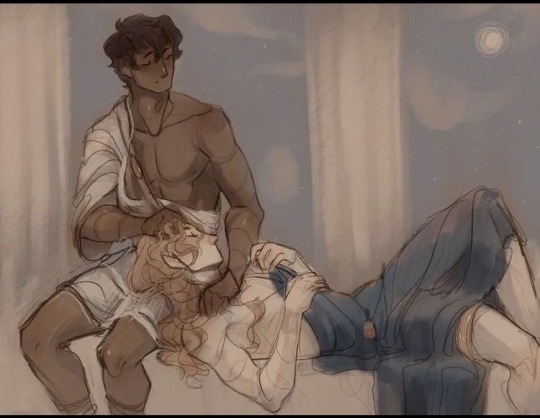

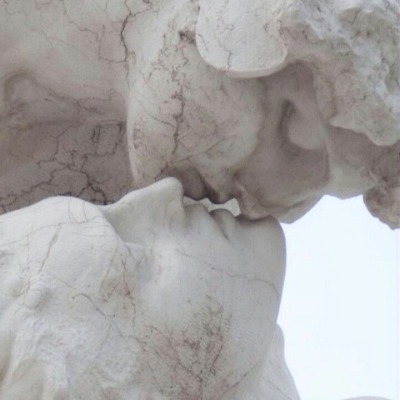

summary: Apollo’s child is upset at him for ending a beautiful relationship.
pairing: percy jackson x child of apollo!reader
word count: 481
A/N: reader isn’t dyslexic, or they read the song of achilles in greek. you can choose

“I hate my dad.”
Percy turns to face the entrance to his cabin. There you stand, your arms crossed.
He gulps. The whole Luke Castellan deal.. he seriously hopes you’re joking. It’s been almost a year since the Battle of Manhattan. His life had changed afterwards, going missing and everything. He had missed out on months of your relationship after Hera put him to sleep. The moment he returned to Camp Half-Blood and saw you, it was like the world was finally rewarding him for all he’s done for it.
He really hoped you didn’t want to repeat Luke’s idea.
“Why?”
You huff, walking into Cabin 3, sitting onto his bed. You poke at his group of sea creature stuffed animals.
“Have you read Song of Achilles?”
Percy sits beside you. He recounts you talking about a book you’ve been reading. Too bad Percy isn’t a reader. He’s dyslexic anyways.
“Nope.”
“Well, you know the end of Achilles’ life story?”
“His heel was struck by an arrow?”
You shake your head. He tilts his head, curious.
“His lover Patroclus died while wearing Achilles’ armor and trying to get the army into Troy’s walls. Achilles, fueled by rage, defeated a god to reach the man who killed Patroclus. Achilles ended up dying because he wanted to make the whole world pay for killing Patroclus.”
Percy nods.
“What does this have to do with your dad?”
You frown deeply. His hand automatically wraps around yours in response, giving a gentle squeeze. He hates seeing you upset.
“My dad pushed Patroclus off the wall of Troy. The second time, he loosened the straps of his armor and people realized he wasn’t Achilles. Hector then killed Patroclus.”
Percy pieced the information together. He leaned his head on top of yours.
“You’re upset at your dad because he killed two people you’ve never met?”
“They were in love, babe!”
“Right.”
You pull away and narrow your eyes at him. He gives you a playful smile, pulling you to his side and kissing the top of your head.
“I’m sure your dad learned his lesson. I don’t think he’ll do it again.”
“He better not. I won’t be on speaking terms with him, then.”
Percy laughs lightly. The Apollo children were kind of spoiled; their father visits them in dreams and answers prayers often. They have relationships other demigods dream of. Even Percy gets a little jealous sometimes, when his dad doesn’t answer him about something.
“You’ll have to tell me what he says when you confront him about it.”
“Oh, I will.”
You then pull away so that you can sit on his bed properly. You cross your legs and face him. He copies you, and you take hold of his hands.
“Now that I’ve finished the book, though, can I tell you about my favorite parts?”
His face breaks into a large smile.
“Of course.”

816 notes
·
View notes
Text
The humans in Greek Mythology are the mega rich and powerful:

In my college classes people are often shocked when I tell them my favorite part of Greek mythology is the gods themselves and I'm not a big fan of the humans.
99% of my classmates prefer the humans in mythos, especially the ones that stick it to the gods like Sisyphus and feel bad for humans like Kassandra and Helen who have been wronged by the gods because "they're just like us." My classmates and teachers hate the gods and don't understand why anyone in modern times would want to worship such violent and selfish beings whenever I point out there are still people who worship them. They hold onto the idea that people in mythology embody the human experience of being oppressed by terrible gods and fate and we should feel bad for them because "they're human just like us" but they forget that the people in Greek Mythology are NOT just like us. They are more relatable to medieval royalty, colonizers and ultra rich politicians who make laws and decisions on wars and the fates of others, especially the poor and the very vulnerable.
Every hero or important human in Greek Mythology is either some form of royalty or mega rich politician/priest-priestess (of course this is with the exception of people who are explicitly stated to be poor like the old married couple in the myth where Zeus and Hermes pretend to be panhandlers). All of them have an ancient Greek lifestyle more relatable to Vladimir Putin, Donald Trump, and especially to British royalty during the British empire, than the average person.
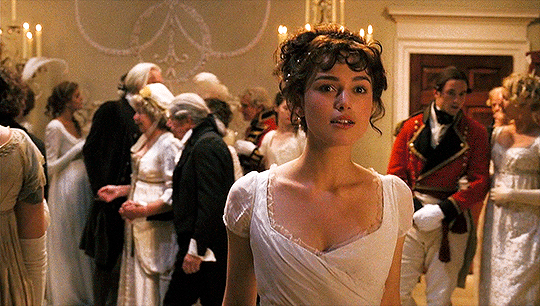
All of them.
Odysseus, Patroclus, Theseus, Helen of Troy, Kassandra, Diomedes, Agamemnon, Perseus, Hercules, Aeneas, Paris, Any human who has a divine parent or is related to one, etc. Although sometimes the story omits it, it is heavily implied that these are people who own hundreds or even thousands of slaves, very poor farmers and the tiny barely there working class as royal subjects.
They are the ones who make laws and whose decisions massively affect the fates of so many people. So no, they can't just be forgiven for some little whim, because that little whim affects the literal lives of everyone under their rule. By being spoiled they've just risked the lives of thousands of people and possibly even gotten them killed like when Odysseus' audacity got every single slave and soldier in his ships killed or when Patroclus as a kid got upset and killed another kid for beating him at a game. (A normal person wouldn't kill another person just for winning a game but royalty and those who think they're above the law do it all the time, plus the class status of the child wasn't mentioned but the way he didn't think he'd get in trouble implies the kid was of lower class, possibly the child of a slave or a foreign merchant.)

The gods get a bad reputation for punishing the humans in mythology but, if not them, who else is going to keep them accountable when they are the law?
And whose to say the humans beneath them weren't praying to the gods in order to keep their masters in check?
Apollo is the god in charge of freeing slaves, Zeus is the god of refugees, immigrants and homeless people, Ares is the protector of women, Artemis protects children, Aphrodite is the goddess of the LGBT community, Hephaestus takes care of the disabled, etc. It wouldn't be surprising if the gods are punishing the ultra rich and powerful in these myths because the humans under their rulership prayed and sent them as they did historically.
Every time someone asks me if I feel bad for a human character in a myth, I think about the many lives affected by the decision that one human character made and if I'm being completely honest, I too would pray to the gods and ask them to please punish them so they can make more careful decisions in the future because:
They are not just like us.

We are the farmers, a lot of our ancestors were slaves, we are the vulnerable being eaten by capitalism and destroyed by the violence colonialism created. We are the poor subjects that can only pray and hope the gods will come and correct whatever selfish behavior the royal house and mega rich politicians are doing above us.
And that's why I pray to the gods, because in modern times I'm dealing with modern Agamemnons who would kill whatever family members they have to in order to reach their end goal, I'm dealing with everyday modern Achilles who would rather see their own side die because they couldn't keep their favorite toy and would gladly watch their subjects die if it means they eventually get their way. The ones that let capitalism eat their country and it's citizens alive so long as it makes them more money. These are our modern "demigods," politicians who swear they are so close to God that they know what he wants and so they pass laws that benefit only them and claim these laws are ordained by God due to their close connection just like how Achilles can speak to the gods because of his demigod status via his mother.
Look at the news, these are humans that would be mythical characters getting punished by Greek gods which is why anything Greco-Roman is jealousy guarded by the rich and powerful and is inaccessible to modern worshippers because Ivy League schools like Harvard and Cambridge make sure to keep it that way. That's what we're dealing with. These are the humans these mythical beings would be because:
In our modern times the humans in mythos would be the politicians and mega rich that are currently ruining our society and trying to turn it into a world where only the rich can manipulate wars and laws, just like they do in mythology.
Fuck them.

I literally have so much more to add about my disdain for them and I didn't even touch on the obvious ancient Greek propaganda.
454 notes
·
View notes
Text
If Hades raised Nico and Bianca Part 13 (feat Solangelo)
Bianca: Just tell him. How bad can it be?
Nico: Uhm...Achilles?
Achilles: Nico! Bianca! You've returned! *hugs them tightly* Ah, it's good to see you again, little ones
Nico: Mhm. *muffled noises*
Achilles: *lets go*
Bianca: Thank you. Anyway, Nico has something he'd like to tell you
Nico: uhm...You remember when Patroclus said that my philtatos can also be a boy?
Achilles: Of course.
Nico: Uhm...I...*deep breath* I met someone.
Achilles: What?! Who?! When?!
Nico: H-His name is Will Solace. We just started dating
Bianca: They've been together for around 2 months now.
Achilles: That's great! Nico, that's great! I'm happy for you.
Nico: Thank you.
Achilles: So why are you telling me?
Nico: Well, I wanted you to know and...
Bianca: He wanted to get your approval of him
Achilles: Nico, you don't need my approval on your relationships
Nico: Hold that thought So, the thing is, I met him at camp
Achilles: ...okay? So he's also a demigod.
Nico: Yes.
Achilles: That's wonderful. Whose child is he?
Nico:
Achilles:
Nico:
Achilles: Nico?
Bianca, smiling: Apollo
Achilles:
Nico:
---Later---
Bianca, entering the throne room: Papa
Zagreus: Hey, Bianca.
Hades: Bianca, is everything okay?
Bianca: Sort of. We need your help
Hades: What happened?
Bianca: You know how Nico started dating Apollo's son?
Hades: William? Yes, of course.
Bianca: Yeah, well, Nico told Achilles
Zagreus: Oh no
Bianca: And now Achilles is trying to go back to the living world because he proclaims that he simply wants to "talk" to him.
Hades: Oh dear. Well then, where's Nico?
Bianca: Summoning armies of dead people to try and stop him.
Zagreus: I don't think that'll be effective. He's the one who killed them in the first place
#pjo#percy jackson and the olympians#percy jackson#hades#nico di angelo#bianca di angelo#zagreus#solangelo#will solace#achilles#patrochilles#the song of achilles#song of achilles#tsoa
433 notes
·
View notes
Text
I've just re-read the short lived duel that Aeneas and Achilles have in Book 20 of the Iliad and it's actually the most hilarious fucking thing.
So it starts out with Apollo disguising himself as Lycaon, one of Priam's many sons, and telling to have a go at Achilles. Keep in mind that this is post-Patroclus Achilles. Aka: berserk Achilles. Aka: so fucking mad he would fight a literal river Achilles.
Aeneas, who is capable of critical thinking, says he doubts he can actually take him on. He also references a time when he was herding cattle on Mount Ida and Achilles ambushed him, adding that the only reason he survived then was because Zeus gave him enough strength to book it (cracking up the official times that he's been saved by a god from certain death to 3, you go dude!).
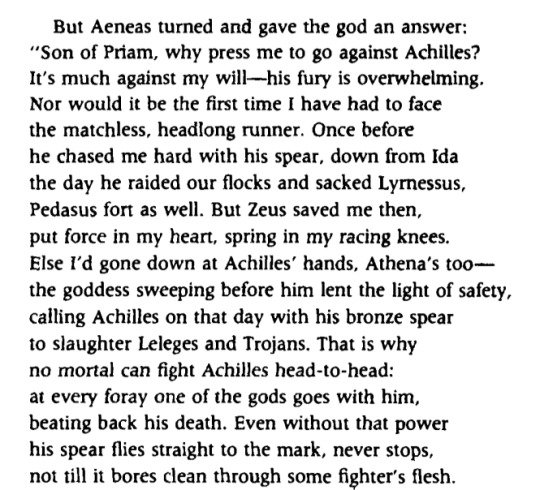
However, after a bit of back and forth and a ton of hyping up on Apollo's part, Aeneas decides to try anyway.
Like, what could possibly go wrong?
Achilles notices Aeneas charging at him and he begins to taunt him. It's something among the lines of: "I'm sorry, are you, background trojan character #61, actually gonna try and beat me? And then what? Do you think that Priam will reward you in some way? Maybe making you king after him? Well it's BULLSHIT, because Priam fucked so much that your chances of succeeding him are basically 0. Ahah. Loser."
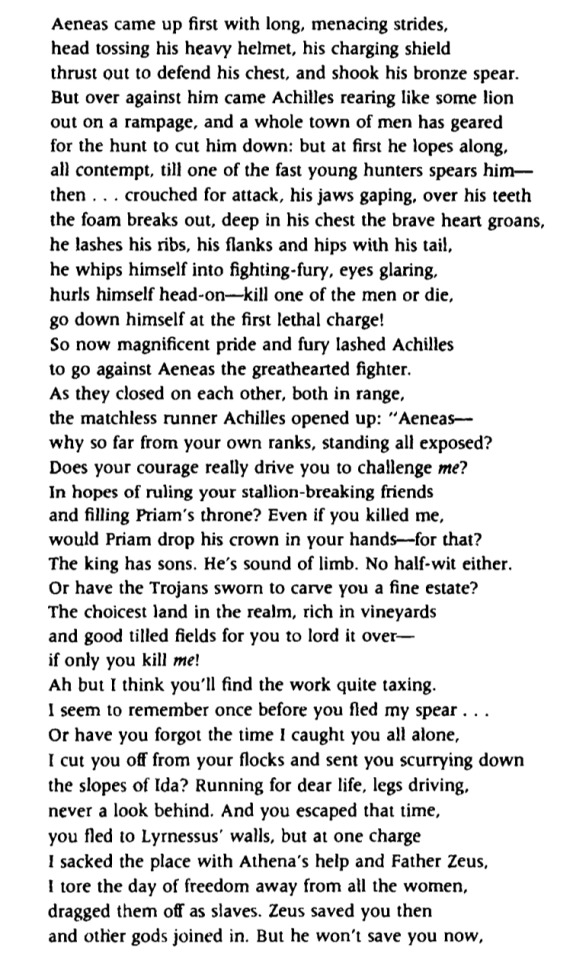
Now, you'd think that maybe Aeneas got enraged at the comment and attacked him, or maybe he even got scared and backed down, but NOPE. What does Aeneas do?
Well, first of all, he insults Achilles' insults, comparing his bickering to that of a child. Literally, "I heard third graders do better than that." And then he decides to list his and Hector's entire fucking family tree.
You know that part of the Bible that's like "this guy sired this other guy, and this other guy sired yet another guy" and so on? It's basically that.
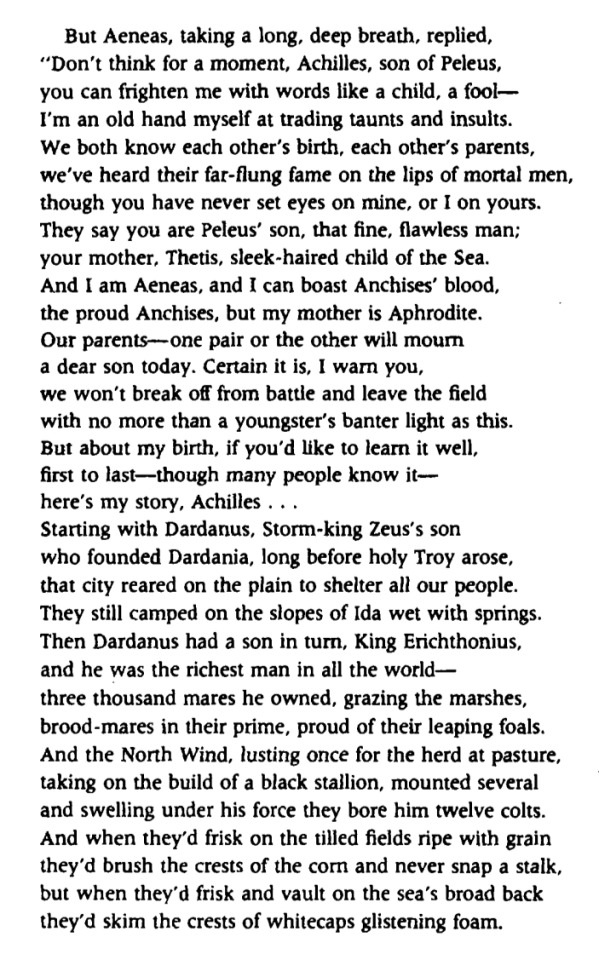
So after he's done with all that, Aeneas states that while he'd love to have a battle of insults with Achilles, because according to him he's actually very good at insulting people (his words, not mine), they should probably throw hands now. Achilles agrees.
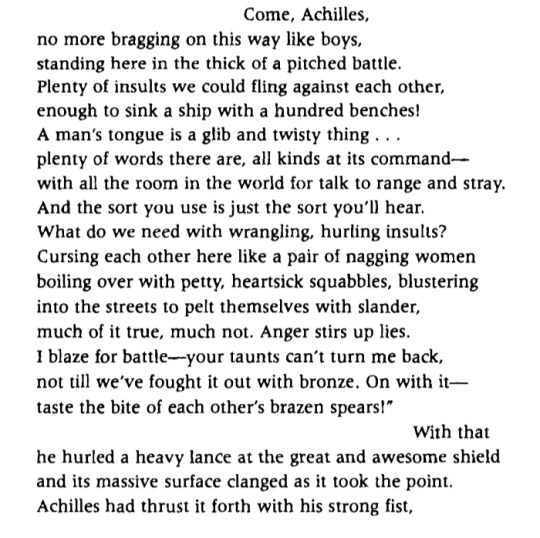
The duel is shortlived and Aeneas gets his ass handed to him. Badly. As expected. And he's about die when ✨️POV shift✨️ we're not on Olympus where Poseidon, Hera and Athena are watching this absolute train wreck go down.
Poseidon, pitying Aeneas, suddenly goes on a rant. It's something among the lines of: "come on guys, look at him, he's just a little guy! He literally has no stakes in this war, he doesn't deserve to die here! He even gives us lots of gifts and sacrifices, he's literally such a nice guy. How can we do this to him!?
...oh and also he's part of some prophecy, Zeus would get mad if he died."
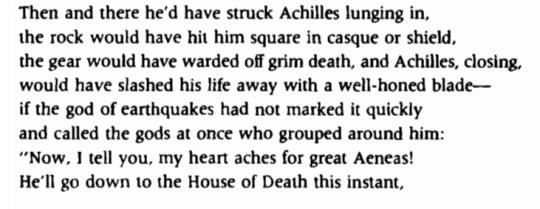
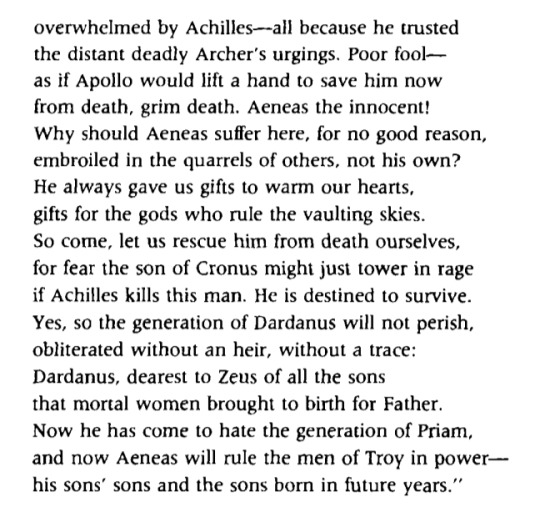
The fact that the way it's worded makes it sound like Aeneas being part of a literal prophecy is an afterthought to him absolutely floors me, Poseidon is literally just attached to a random dude that's fighting on the opposite side to his because he thinks he's nice.
After all that Hera is pretty unimpressed and states that she really doesn't care if our man lives or dies as neither her or Athena have ever saved a Trojan from death, she however adds that Poseidon is free to do whatever he wants.
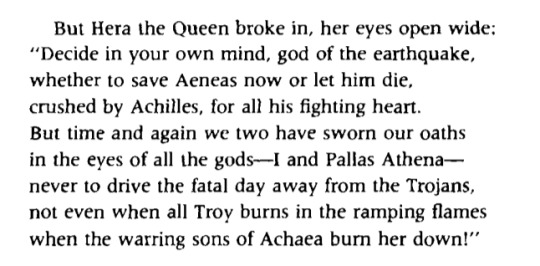
The literal moment Hera stops talking, Poseidon lunges down from Olympus and onto the battlefield to look for the two combatants. When he does, he saves Aeneas like only he can do.
You know how when Diomedes first tries to kill Aeneas, Aphrodite gently folds her hands around him to shield him? There's none of that here. Poseidon just runs up to him and literally flings the motherfucker.
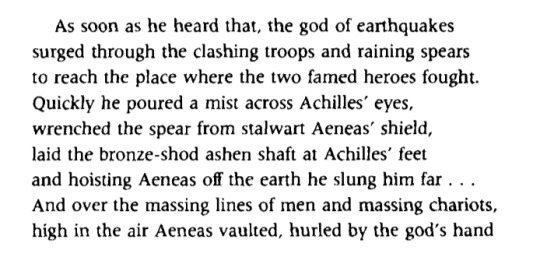
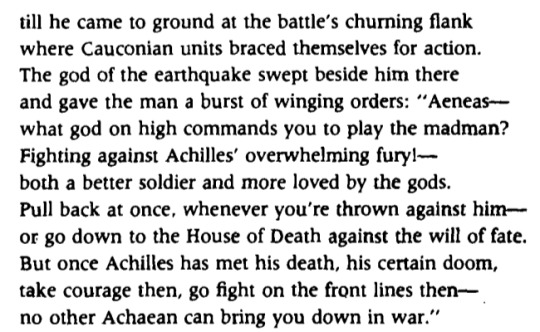
It literally says that he flies "high in the air". It's like a Looney Toons sketch.
So Aeneas lands and, while he's obviously a bit dazed, Poseidon proceeds to call him a madman and essentially tells him to never do something stupid like that again and just wait until Achilles is dead, then he'll be able to murder Achaeans to his heart's content. Aeneas is fine with that.
Achilles, who just saw his opponent just get yeeted into the fucking sky, just shrugs and goes "welp, guess that guy's off limits, I'm gonna go kill someone else now I guess lol".
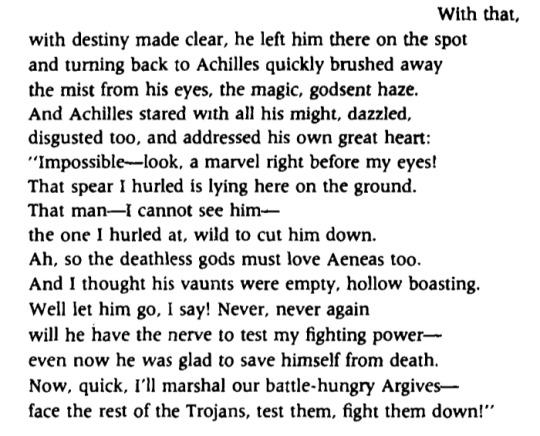
This entire scene is pure fucking gold and the fact that I've literally never seen anyone talk about it just breaks my heart.
1K notes
·
View notes
Text
My Thoughts on the Trojans (after reading the Iliad)
One thing about me, I’ll always call Hector and Paris a cunt (Paris moreso) no matter what Achilles has done. Because let’s talk about it:
-The trojans quite literally only had Apollo because Ares and Aphrodite kept getting their asses handed to them (it hurts but its true). AND to top it all off they lost Ares. If I was any trojan and found out Ares, GOD OF WAR, left me I’m giving up immediately ☠️
-HECTOR aint even kill Patroclus in a fair 1v1! Patroclus called him a pussy and said his boyfriend is going to kill him and I GIGGLED because yeah 😭
-Paris is a cowardly idiot either way. Whether people want to believe Helen loved him or not, hes STILL a coward idc.
-Idk how people can think the Trojans were the ones in the right. You STOLE their queen (because im pretty sure she loved Menelaus), then LOOTED Menelaus afterward, then dipped after a treaty? Wtf was Menelaus supposed to do? You think he would be respected as a King if he let that shit slide?
-If I was Hector id kick Paris out of Troy and make him give that woman back so quick the ship wont be able to sail. Idgaf if hes my brother I dont even know him like that 💀 they have Achilles and you won’t me to risk my balls so you can get ballsdeep in a woman who DONT WANT YOU? What is this? I have a WIFE and KIDS and OTHER siblings? Fuck that.
-ALSO the Trojans don’t got NOBODY in give a shit about other then the gods.
#YES I READ THE ILIAD#but I’m protecting Achilles#Patroclus#Achilles#patroclus x achilles#patrochilles#apollo greek mythology#greek mythology#trojan war#odysseus#hector of troy
111 notes
·
View notes
Text
I don't think Greek Mythology retellings/adaptions/inspired/etc. are necessarily "evil"...but I DO think people REALLY need to understand that there's a huge difference between the actual mythology and certain media.
I feel like people have to basically do a "Fandom ___" to say the different versions. Like "PJO ___", "Hades game ___", "TSOA ___". For it to be understood that these depictions are DIFFERENT. I'm saying this as someone who grew up reading PJO and still has a soft spot for it. But as someone who really loves Greek Mythology as well, I sometimes get really SAD.
I'm going to use the comparison of Howl's Moving Castle with it's Book Vs. Movie. I enjoy both!!! But they are honestly very different. In the movie there is no "sister swap", Markle isn't a young teenager, Sophie doesn't throw weed killer at Howl, and many more moments. But I enjoy both because even though there are changes they still keep components that are ingrained into the characters!
In some Greek Myth retellings/adaptations/stories/etc., characters are...SO different from the source material. That's fine...Choose what you want with your story... But folks should know that the modern adaptations are NOT the source material!!!
It bothers me that a lot of these wonderful myths and stories are twisted up and seen so differently because of a modern version of them. You can have that character be "awful" or a certain way in your story. But I almost feel that as fans, it's not good to generalize them or see it as "This is the truth". People are hating the mythological figure when it's only in that interpretation they are like that.
In PJO, Ares is "Zeus' favorite", isn't a good dad, a misogynist, etc. The actual myths? One of his Epithets is LITERALLY "Feasted by Women", in the Iliad everybody basically bullies him with Zeus literally saying he hates him. He cries when he learns one of his sons is killed in the war. He literally kills someone about to rape his daughter. Ares isn't perfect but it makes me sad with how he's viewed and talked about when it's only in PJO he's like that. Same with Dionysus. Read the Bacchae, you'll love it.
In Lore Olympus, Apollo rapes Persephone (noticing the fact that modern takes on the myths add rapes where there never were hmmmmm) when he never did in any of the myths.
In TSOA, Thetis is cruel when in the Iliad, she is such a loving mother to Achilles. She grieved alongside her son over Patroclus. Also with Agamemnon. In Ipheginia at Aulis, Agamemnon is a MESS. He adored his children.
In Circe, Odysseus is viewed as a selfish man who ONLY hurts others and doesn't care about his family when that is LITERALLY his one consistent character trait. HE is actually the one who is the victim of rape. Circe was never raped.
Medusa is only a victim in Ovid's, a Roman man, works. Not in GREEK mythology. She was just a cool monster. Leave Perseus alone. Poseidon and Medusa actually had a consensual relationship in Greek Mythology!
These adaptations/retellings/inspired by/etc. whatever anybody wants to call them, are not the real myths! They may be similar in some ways but to just generalize them or hate the deity/mythological figure because of something they did in the new media feels fucked up!
You can enjoy these new stories. There's nothing wrong with that!!! But know they're not the real myths. Maybe even label it as "I hate ____'s version of ____". As that makes it clear what version you're talking about.
#I'm probably wording this very weird. I'm sorry for that haha#idk I'm getting sad#I'm clutching the gods and my special lil heroes to my chest to protect them from the hate.#this is silly but...idk had to say it :(#anti circe#anti madeline miller#sorry but that book makes me the sad™#greek mythology#tagamemnon#Mad rambles#shot by odysseus#PJO is special to me but I'm protecting the Gods >:( They can suck in PJO. to say the suck in the myths when you don't know the actual#myths is...sad#tw rape#<because so many adaptations ALSO add them when they're not there!!!!#save me morally gray circe#essay
99 notes
·
View notes
Text
I find very funny that there's a lot of people who like Achilles but hate Paris; because, they're very similar characters.
Like, what did Paris do that Achilles didn't? Honestly, I think it's more about the way these two characters are portrayed in the Iliad.
Because think about it. Both are beautiful, both are associated with Apollo, both have scenes in the iliad where they're resting with their partners while everyone else is fighting, both are the reason a lot of their comrades are dying because of a woman they feel entitled to (Helen and Briseis).
I think that the only thing they truly differ; besides their skill level in combat, is that when Hector reprimanded Paris, he went back to fighting; meanwhile when Patroclus reprimanded Achilles, he still refused.
So, what is the big difference between Achilles and Paris that made everyone hate Paris but like Achilles? The way these two characters are framed in the Iliad.
Personally, I think both characters are very interesting, and it's fun to imagine Paris as a negative version of Achilles (or Achilles as a negative version of Paris depending on how you look at it).
But now that I think about it. Everyone remembers how when Achilles killed Hector he was killing himself? Well, if I think of Achilles as a reflection of Paris, then when Paris killed Achilles he too was basically killing himself in the end? It would make sense then why Paris had to be the one to kill Achilles.
#Iliad#the iliad#greek mythology#Achilles#Paris of Troy#ramblings#Both are awful. That's why I love them#Anyway. Hector and Patroclus are too a reflection of each other#And Hector becomes Achilles when he puts on the armor#so is like Patroclus=Hector=Achilles=Paris#In the end that just means that everyone is Achilles /j#I don't know what I'm talking about but it makes sense in my head
135 notes
·
View notes
Text
a second chance at death (and happiness)
Achilles had known that he would choose glory over a long life the moment he won his first duel. Granted, that duel had been against Patroclus, who he had already fallen in love with. The two vowed to bathe in the Lethe together once they reached Elysium, so they could have one or more lives together somewhere else. They shared the same heart, so they should share the same adventures.
And then Patroclus died, killed by Hector while wearing Achilles's armor. Achilles had never known grief like that before, and his only comfort was the visit from his beloved's ghost, after he'd tried to bury all his pain with Hector's. When Apollo's arrow, guided by Paris, found its home in Achilles's tendon, he cried out of course, but he was glad. He could tell by the strength of the poison (and how it sapped his own) that it was going to kill him. For a second, he remembered kind Chiron, and his own son Neoptolemus--and he pushed their memories aside. Achilles would be with his missing half as soon as he closed his eyes...
He found himself in the Fields of Asphodel, where he and the other shades, ghosts with hardly any color, wandered aimlessly between plain trees, only able to groan as opposed to talk. With a heavy heart and rage directed at the gods, Achilles sat and wept. Patroclus had gone to Elysium--why wouldn't he?--but Achilles had been damned. It felt like forever before he and all the other shades' attention was drawn to something with an enticing scent that seemed familiar...ah, blood. The thing that landed him in his own personal Hell. But he never expected to see Odysseus, solid and alive in Hades. As soon as he got the chance, Achilles warned the man against dying, explaining his own suffering. Odysseus had always been a person who commanded respect, and yet Achilles did not truly understand why until the hero convinced Lord Aidoneus himself to resurrect Achilles.
The king of Hades would warn Achilles against being impious in any way, but Achilles already knew. He would not mess up his chances at an afterlife (or another life) with Patroclus. And maybe he'd get to see his son after all--according to Odysseus, Neoptolemus should've grown up and married. Achilles had a brief reunion with his mother (a big hug and lots of kisses on his cheeks), then went to join Odysseus.
"I hope I'm not too late," Achilles said, only walking up to the older man once he and his people were done burying their friend. He held out his hand, thankful for the opportunity. Just breathing fresh air felt like a blessing, though it was far from the kind Achilles desired. "You quite literally saved my life. I am in your debt."
@eternaljunkyard
73 notes
·
View notes
Text
The myth of Apollo (2)
This is a loose translation of Alain Moreau's article "The Antique Apollo: Shadow and Light".

II/ The ambiguous god
The mystery that shrouds Apollo’s origins, this enigma that disconcerts the scholars, had the advantage to allow the artists a freedom of imagination: since the shape of the primitive character of the god is drowned and blurred, he can be depicted as either a god of light, or a god of shadow and death; However, even within the most clear-cut portraits, his complexity remains. Apollo is never a god entirely just and good ; but he is never fully aligned with malevolent powers.
According to the beginning of the Iliad, Homer chose to depict the dreaded aspect of the go. Apollo, angered against Agamemnon’s army, hits them with a terrible disaster, (nousos, loimos), the plague: “A terrible sound came out of the silver bow. He first attacked the horses, like fast dogs. Then, it is men that are hit by his sharp arrow, and the funeral pyres burn hundreds ceaselessly.” Fervent enemy of the Greeks, it is Apollo that throws against the Achaean wall all the rivers of the Mount Ida ; it is also him that hits Patroclus in the back and offers him unarmed to the spear of Hector. And yet, this terrible god is also the one that brings a painless death, and then the cruel arrows become the “soft arrows”. He is hostile to the Achaeans, but he brings a tireless protection to the Trojans. Aeneas, Glaucos, Hector are all helped by him. He constantly assists them, recomforts them, stimulates them, saves them. If his shot brings death, it can also repel evil. Apollo is “the one that preserves” (hekaergos). Throughout the centuries, many epiclesis will attest this trait: alexikakos, apotropaios, epikourios…
In a reverse way, the “Homeric Hymn”, which is all about the glory of this conquering god who is eternally young and beautiful, oes not hide his “boundless pride”, and he is shown easily tricked. Young Apollo does not have the same temperance and moderation that will become the fundamentals of the Delphi wisdom, engraved on his very temple (“Know thyself”, “Never too much”) ; and young Apollo also lacks the omniscience of his father Zeus.
But with Pindar, at the beginning of the Classical age (5th century), he gains omniscience: in the “Pythics” he is described as “knowing the fatal term of all things and all the paths they take”, as “being able to count the leaves the earth grows during spring, and the grains of sand that roll under the waves of the sea or the river, and the flows of the wind” ; and as “you who sees clearly the future and its origin”… As a generous god, he also offers to humanity benevolent gifts, and maintains peace: “It is him that gives to men and to women the remedies that heal cruel diseases ; he gave us the cithara ; the Muse inspires those that please him ; he places in the hearts the love for concord and the horror of civil war. He rules the prophetic sanctuary.” As a son of Zeus, he himself becomes the embodiment of the divine, of the unnamed, of the celebrated “theos”. But Pindar didn’t go as far as to erase the other Apollo, the cruel god of destruction. Apollo takes his revenge over an unfaithful Coronis by sending Artemis, a merciless and blind executioner, to kill her with a brutal death – and so will perish numerous innocents whose sole crime was to live near the culprit.
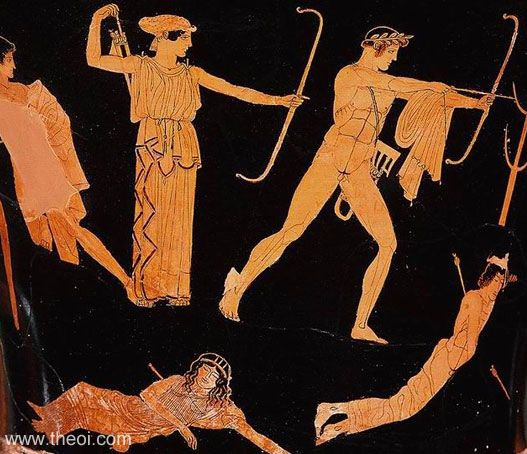
Aeschylus’ Apollo, contemporary to the one of Pindar, brings a halt to the evolution of the god – and even a regression. In his tragedies, we have a bloodthirsty god that massacres with his arrows all of Niobe’s sons: his wrath is unflinching. Laios disobeyed the oracle: at the seventh door, the god will cause the fratricide of his grandsons Eteocle and Polynice (The Seven Against Thebes). Cassandra did not keep her promise: she will be mocked, captured and murdered. But the god, just like the perjury girl, does not hold his promises: after predicting to Thetis that all the gods will protect her bloodline with all of their love, he kills her son Achilles (The Judgement of Weapons). He is a god that scares people: “Phoibos” is close to “phobos”, fear and scare (The Persians). “Apollon” is close to “apollôn”, “he who destroys” (Agamemnon). The justice Apollo offers is an archaic justice, a vendetta logic: kill the one that killed. When he fights the Erynies within the play “The Eumenids”, he is not above them in any way: they have the same violence, the same bad faith, the same contradictions. And yet… this god is invoked by the messenger of Argos as the savior and the healer (Agamemnon). This imperfect god is the ambassador of Zeus, as it is highlighted many times during “The Eumenids”. This conquering god settles with pacifism on the ancient throne of Delphi: within “The Eumenids”, no murder of any dragon is mentioned. The god of darkness keeps some traits from the god of light.
The regression of Apollo within Aeschylus’ plays is explained by the turmoil of a world that was building: the Greek city was being born among a set of social and political tensions that impacted the way the thinkers saw the cosmos. Euripides’ own regression of Apollo can be explained by a world that is falling apart. The cities are fighting with each other, beliefs are weakening, the gods are falling from their pedestal and are lowered to the same level as mankind. It is the Dioscuri that absolve Orestes of the death of Clytemnestra. And the culprit of the crime is designated as Apollo, which gave “an unwise order” (Electra). A god full of grudges, he never forgives any offense. It is within his own sanctuary, in a treacherous way, by the arms of a thousand men, that he takes his revenge upon Pyrrhus, right as the latter was coming to make amends: “Here is how the Lord that gives oracles, the arbitrator of the law for all humankind, treats the son of Achilles as he was offering reparation! Just like a wicked man, he remembered old feuds. How could he then be wise?” (Andromache). Another proof of his lack of wisdom: he rapes Creusa. “Ah! Do not act in such a way ; if you have the power, practice the virtue! Because anyone who is wicked is punished by the gods. Then, how can we stand that yourselves, that make laws for the humans, be recognized of violating those laws? (Ion).
And yet, the Apollo of Euripides can also be as shining as the god of Pindar and of the Homeric Hymn: “How beautiful are the children of Leto, that she of Delos birthed in the fecund vales of the Isle – the golden-haired god, knowledgeable lyre-player, and the goddess proud in her talent at shooting with a bow!” (Iphigenia in Taurid). The bloodthirsty god can preach for peace: “Go you way, and may the most beautiful goddess, Peace, be in your home with honor.” (Orestes). And, while the poet is very critical of the god’s actions during “Ion”, he still sings the luminous and cosmic beauty of Delphi which, according to him, would have never been as great as it is if it wasn’t for the grace of its god: “Here is the brilliant four-horse chariot: Helios, already, sheds light upon the earth. And the stars flee the ether that is enflamed among the sacred night. The untouched peaks of the Parnassus, drowned in light, welcome for mankind the disc of the day.”
The ambiguity of the god, tied to his origins, is maintained as much within the works of those that criticized him, as in the texts of those that admired and respected him.

27 notes
·
View notes
Text
My Roman Empire is how I haven't seen any good depiction of the rawness and just how fucking metal Patroclus' last fight and death truly was as in the Illiad. Even his words were just the freaking best.
HE BLINDS AND KILLS ONE OF PRIAM'S SONS(Cebriones) IN FRONT OF HECTOR WITH A ROCK RIGHT AS THEY STARTED TO FIGHT. And the mf even started roasing[taunting] the poor man after dying wtf.
SCALING THE WALLS THREE TIMES BEFORE APOLLO HAS TO SHRIEK TO HIM TO LEAVE.
"Hector! Now is your time to glory to the skies . . . now the victory is yours. A gift of the son of Cronus, Zeus-Apollo too—they brought me down with all their deathless ease, they are the ones who tore the armor off my back.
Even if twenty Hectors had charged against me— they'd all have died here, laid low by my spear. No, deadly fate in league with Apollo killed me. From the ranks of men, Euphorbus. You came third, and all you could do was finish off my life . . . One more thing-take it to heart, I urge you— you too, you won't live long yourself, I. swear. Already I see them looming up beside you-death and the strong force of fate, to bring you down at the hands of Aeacus' great royal son . . .
Achilles!"
GO FUCKING OFF KING 👑😤🗣😤🗣👑🗣🗣🗣😤👑🗣👑👑👑👑🗣🗣🗣🗣👑👑👑🗣😤🗣😤🗣🗣👑🗣😤👑😤🗣😤🗣😤🗣🗣
27 notes
·
View notes
Text
THIS DAY IN GAY HISTORY
based on: The White Crane Institute's 'Gay Wisdom', Gay Birthdays, Gay For Today, Famous GLBT, glbt-Gay Encylopedia, Today in Gay History, Wikipedia, and more … February 14




c.2000 B.C. - 1200 B.C. – Ganymede, a beuatiful shepherd boy, was abducted by Zeus , king of the Gods, from Mount Ida, near Troy. Ganymede had been tending sheep, a rustic or humble pursuit characteristic of a hero's boyhood before his privileged status is revealed. Zeus either sent an eagle or turned himself to an eagle to transport the youth to Mount Olympus.
In the Iliad, Zeus is said to have compensated Ganymede's father Tros by the gift of fine horses, "the same that carry the immortals", delivered by the messenger god Hermes.
In Olympus, Zeus granted Ganymede eternal youth and immortality and the office of cupbearer to the gods, supplanting Hebe. All the gods were filled with joy to see the youth, except for Hera, Zeus's consort, who regarded Ganymede as a rival for her husband's affection. Zeus later put Ganymede in the sky as the constellation Aquarius.
Plato accounts for the pederastic aspect of the myth by attributing its origin to Crete, where the social custom of paiderastía was supposed to have originated. He has Socrates deny that Ganymede was the "catamite" of Zeus, and say the god loved him non-sexually for his psychē, "mind" or "soul," giving the etymology of his name as ganu-, "taking pleasure," and mēd-, "mind." Ganymede, he points out, was the only one of Zeus's lovers who was granted immortality.
In poetry, Ganymede became a symbol for the beautiful young male who attracted homosexual desire and love.


c.2000 B.C. - 1200 B.C. – In Classical myth, Hyacinth was a beautiful boy and lover of the god Apollo, though he was also admired by the West Wind, Zephyr. Apollo and Hyacinth took turns throwing the discus one day. Hyacinth ran to catch it to impress Apollo, was struck by the discus as it fell to the ground, and died.
In one telling of the tale, the wind god Zephyrus was responsible for the death of Hyacinth. His beauty caused a feud between Zephyrus and Apollo. Jealous that Hyacinth preferred the radiant archery god Apollo, Zephyrus blew Apollo's discus off course, so as to injure and kill Hyacinth.
When he died, Apollo didn't allow Hades to claim the boy; rather, he made a flower, the hyacinth, from his spilled blood. It's a very moving story that has been the basis of many works of art over the centuries.

According to Ovid's account, the tears of Apollo stained the newly formed flower's petals with the words ai ai, the Greek cry of grief. The flower of the mythological Hyacinth has been identified with a number of plants other than the true hyacinth, such as the iris.


c.1200 B.C. – In Greek mythology, Patroclus, or Patroklos, was the son of Menoetius, was Achilles' beloved comrade and brother-in-arms.
In his youth, Patroclus accidentally killed his friend, Clysonymus, during an argument over a game of dice. His father fled with Patroclus into exile to evade revenge, and they took shelter at the palace of their kinsman King Peleus of Phthia. There Patroclus apparently first met Peleus' son Achilles. Peleus sent the boys to live in the wilderness and be raised by Chiron, the cave-dwelling wise King of the Centaurs.
In a post-Homeric version, he is listed among the unsuccessful suitors of Helen of Sparta, all of whom took a solemn oath to defend the chosen husband against whoever should quarrel with him, which brought both the young men into the battle against Troy.
In the Iliad, the two heroes have a deep and meaningful friendship. Achilles is tender towards Patroclus, while he is callous and arrogant towards others. In Athens during the 5th century BC, the relationship was often viewed in light of the Greek custom of paiderasteia (man-boy love).
When the tide of war turned away from the Grreks, and the Trojans threatened their ships, Patroclus convinced Achilles to let him don Achilles' armor and lead the their troops into combat. In his lust for combat, Patroclus pursued the Trojans all the way back to the gates of Troy, defying Achilles' order to break off combat once the ships were saved. Patroclus was stunned by Apollo, then finished off by Hector, hero of the Trojans.
After retrieving Patroclus' body, Achilles returned to battle and avenged his companion's death by killing Hector. Achilles then desecrated Hector's body by dragging it behind his chariot instead of allowing the Trojans to honorably dispose of it by burning it. Achilles' grief was great and for some time, he refused to dispose of Patroclus' body; but he was persuaded to do so by an apparition of Patroclus, who told Achilles he could not enter Hades without a proper cremation. Achilles sheared off his hair, and sacrificed horses, dogs, and twelve Trojan captives before placing his lover's body on the funeral pyre.
While the lIiad never explicitly stated as such, in later Greek writings, such as Plato's Symposium, the relationship between Patroclus and Achilles is held up as a model of romantic love. In the 5th and 4th centuries, the relationship with Patroclus was portrayed as same-sex love in the works of Aeschylus, Plato and Aeschines.
From the times of Classical Greece, and especially in Hellenism, to the time of the Romans, the relationship between Achilles and Patroclus was presented as loving and pederastic, although these roles are anachronistic for the Iliad. Achilles is the most dominant, and among the warriors in the Trojan War he has the most fame; Patroclus performs duties such as cooking, feeding and grooming the horses, and nursing yet is older than Achilles. Both also sleep with women.
In the 5th century BC, in Aeschylus' lost tragedy the Myrmidons, Aeschylus regarded the relationship as a sexual one and assigned Achilles the role of erastes(older lover or protector), since he avenged his lover's death even though the gods told him it would cost him his own life), and Patroclus the role of eromenos (boy lover). He tells of Achilles visiting Patroclus' dead body and criticizing him for letting himself be killed. In a surviving fragment of the play, Achilles speaks of their "devout union of the thighs".
Plato presented Achilles and Patroclus as lovers in the Symposium, written around 385 BC. The speaker Phaedrus holds the two up as an example of divinely approved lovers. He also argues that Aeschylus erred in saying that Achilles was the erastes, "for he excelled in beauty not Patroclus alone but assuredly all the other heroes, being still beardless and, moreover, much the younger, by Homer's account."

c.1040 B.C. – Jonathan, Son of Saul, born; No one knows exactly when the biblical Jonathan was born, of course. But let's just assign this date to this sweet young man, whose presence in "Holy Writ" has always been an embarrassment to fundamentalist preachers everywhere.
The story of David and Jonathan is well known from the Hebrew bible. It is not explicitly stated that there was a sexual relationship between them but the passionate language is certainly that of lovers.
"And it came to pass, when he had made an end of speaking unto Saul, that the soulof Jonathan was knit with the soul of David, and Jonathan loved him as his own soul. And Saul took him that day, and would let him go no more home to his father's house. Then Jonathan and David made a covenant, because he loved him as his own soul. "
The love of Jonathan for David, a love so deep that he foreswore his father out of loyalty to his beloved, has provided literature with both a powerful trope for male love and one of the most oft-quoted lines of Scripture, spoken by David at the death of his friend: "My brother, Jonathan, thy love to me was wonderful, passing the love of women" (2 Samuel 1:26).

a modern view of David and Jonathan


c.940 B.C. – Asher was a son of Solomon, Caleh a shepherd. By some accounts these were the two lovers in the frankly erotic love poem, the 'Song of Songs', widely used as a metaphor for the love between God and humanity. Usually presented as conventional heterosexual love, there is increasing recognition that the lovers were probably both men.
A translation by Dr Paul R Johnson directly from early texts includes the frankly homoerotic:
"How delightful you are Caleh,
My lover-man, my other half.
Your pleasing masculine love is better than wine.
The smell of your body is better than perfume.
Your moustache is waxed with honeycomb.
Honey and milk are under your tongue.
The scent of your clothing is like the smell of Lebanon."
A review of this book, posted on the Wild Reed, notes that:
"It gets to the heart of the question of whether the Hebrews and early Christians were fundamentally homophobic, or whether, as John Boswell has maintained, homophobia was a later addition. Johnson has consulted with many Hebrew scholars, who reluctantly concede the validity of his revolutionary word-for-word translation."

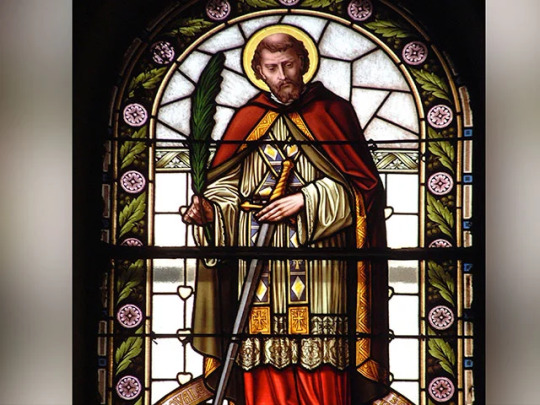
270 – St. Valentine. No no no...Don't jump to any conclusions. St. Valentine was not Gay, but neither did he have anything to do with the holiday for lovers that bears his name. That St. Valentine, one of the more boring Christian martyrs, is the patron saint of lovers is a mere fluke. You see, the Norman word galatin, meaning a lover, was often mispronounced valentin, and through a natural confusion of names, St. Valentine became associated with love.

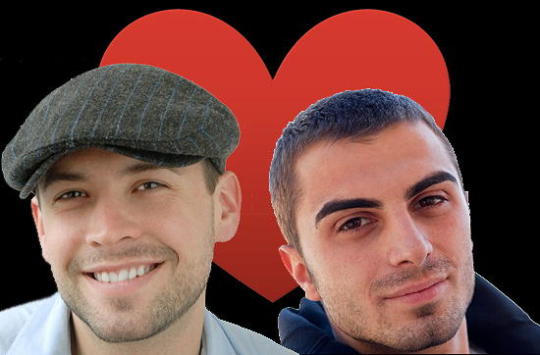


Bishop Peter Ball with Prince Charles (now sick King Charles III)
1932 – Peter Ball (d.2019) was a British bishop in the Church of England and convicted sex offender. In 1960 he and his twin brother (Michael Ball) established a monastic community, the Community of the Glorious Ascension, through which Ball came into contact with many boys and young men.
He was the suffragan Bishop of Lewes from 1977 to 1992 and the diocesan Bishop of Gloucester from 1992 to 1993, when he resigned after being cautioned for sexual abuse; he continued to officiate at several churches after that.
In October 2015, Ball was sentenced to 32 months' imprisonment for misconduct in public office and indecent assault after admitting the abuse of 18 young men over a period of 15 years from 1977 to 1992. Further charges of indecently assaulting two boys, aged 13 and 15, were allowed to lie on file in a contentious decision by the Crown Prosecution Service (CPS). He was released on licence in February 2017 and died two years later.
Peter Ball was the first Anglican bishop to be sent to prison since 1688, when King James II committed seven bishops to the Tower for their opposition to his Declaration of Indulgence.

1962 – Kevyn Aucoin, the American cosmetologist born (d.2002); a make-up artist and photographer who was well known for catering to the laywoman's need to feel beautiful. He worked with hundreds of A-list celebrities like Cher, Janet Jackson, Tina Turner, Gwyneth Paltrow, Courtney Love and Vanessa Williams. He became a highly in-demand makeup artist, often acquiring $10,000 per session for photo shoots or award shows. As a published author (The Art of Makeup, Making Faces, and Face Forward), he was fond of taking celebrities (and various other men & women, including his mother) and using makeup and costume (and sometimes prosthetics) to make them look like other celebrities, or like other people entirely. He transformed Tori Amos into Mary Queen of Scots, Liza Minnelli into Marilyn Monroe, Christina Ricci into Édith Piaf, Hilary Swank into Raquel Welch, Winona Ryder into Elizabeth Taylor, and Martha Stewart into Veronica Lake, among others.
Aucoin was interested in makeup from the time he was a child,and frequently did his sisters' makeup and photographed the results with a Polaroid camera—something he'd do throughout his career. Afraid to buy makeup, he would shoplift it. The guilt of stealing and fear of getting caught made him stop.
He realized he was gay at age six, and was frequently bullied at school. His parents were initially in denial of their son's emerging sexual orientation; his mother later said, "I didn't think Kevyn was a sissy; I just thought he was a gentle child." In one instance, he had a teacher spank his bare buttocks in class, which Aucoin later regarded as sexual abuse. The bullying continued in high school, and he dropped out after being chased by several classmates in a truck. He enrolled in beauty school and had hoped to learn more about applying makeup, but ended up teaching the class instead.
Aucoin lived with his partner, Jeremy Antunes, whom he married in an unofficial ceremony in Hawaii in 2000 and thereafter referred to as his husband. He had also previously been romantically involved with Eric Sakas, who, after their breakup, remained close friends with him and became president and creative director of Kevyn Aucoin Beauty.
In October 2001, just one month after launching his own cosmetics line, Aucoin was diagnosed with a rare pituitary tumour. He had been suffering from acromegaly resulting from the tumour for much of his life, but it had gone undiagnosed. He died in May 2002 of kidney and liver failure due to Tylenol toxicity, due to an addiction to prescription painkillers used to treat the extreme pain from his condition. A musical homage, called Taxi Ride, was written for him by longtime friend Tori Amos.


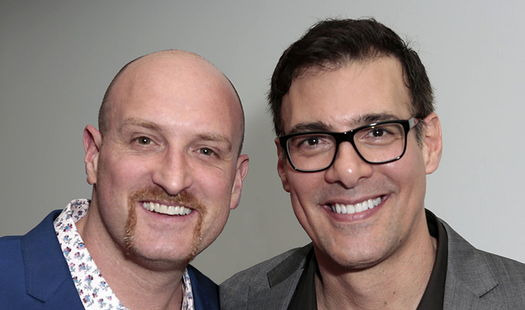
Sucsy (L) with husband Sgourakis
1973 – Michael Sucsy is a Golden Globe and Emmy Award winning film director, screenwriter, and producer. He is best known for creating the HBO film Grey Gardens.
Sucsy was raised in Connecticut and New York City and is a graduate of Deerfield Academy, Georgetown University's Edmund A. Walsh School of Foreign Service (where he earned a degree in International Relations, Law & Organization), and the Art Center College of Design in Pasadena, CA (Masters in Fine Arts.)
Sucsy segued from studying international relations to film production via the advertising industry, where he worked for the award-winning agency Cliff Freeman & Partners on the first-ever Staples t.v. ads. Sucsy then pursued work as a production assistant, an art department coordinator, a production secretary, and an assistant director on feature films, commercials, and music videos in Washington DC, New York City, and Los Angeles.
In 2003, Sucsy was inspired to write and direct a narrative feature film about the famous true story of Jackie O's eccentric relatives "Big Edie" Bouvier Beale and "Little Edie" Bouvier Beale called Grey Gardens after viewing the well-known documentary of the same name. The day after he first watched the documentary, Sucsy embarked on what was to become a six-year process to get Grey Gardens made. He used primary sources including Little Edie's personal correspondence, private journals, and poetry as well as interviews with family members and friends as the basis of his original script which traced the Beales' tragic descent from riches to rags over some forty years. With Drew Barrymore and Jessica Lange attached to star as the reclusive mother-daughter duo, the project made its way to HBO who, in 2006, announced that Grey Gardens was moving into production with Sucsy as its director. Principal photography on Grey Gardens began in October 2007, and it debuted on HBO in April 2009 to great acclaim from critics and audiences, both new and old to the Grey Gardens phenomenon.
Sucsy became engaged to his boyfriend, interior designer Demitri Sgourakis, on February 14, 2012, Sucsy's 39th birthday. They were married on August 15, 2015, aboard the Midnight Rambler, a sailboat, off the coast of Montauk, N.Y.

1984 – Elton John marries a woman having earlier said he was bi.

2010 – On this date the Mexican newspaper La Jornada reported that different LGBT rights organizations from Jalisco, Colima and Guanajuato marched down the streets of Guadalajara to demand equal partnership rights. The group, mostly made up of Lesbian and Gay members from different regional university student groups, carried signs and expressed a desire for having similar rights granted to Gays and Lesbians in Mexico City. The group gathered outside the University of Guadalajara and made their way to the city's main plaza where they staged a kiss-in as the shadow of the city's Metropolitan Cathedral fell on them.
The scene outside the Cathedral gave a better sense of how large the march was, an estimated crowd of 350. In addition to the kiss-in, eleven Gay and Lesbian couples also participated in a symbolic wedding ceremony. There were reports of homophobic insults and obscenities being hurled at marchers even as organizers expressed relief that there were no outbursts of violence.
As in Argentina, marriage equality is a red-hot topic in Mexico ever since the Mexico City legislature passed a bill allowing same-sex couples to marry in Mexico's capital city. The measure, which also explicitly would allow same-sex couples to adopt, has run into vehement opposition from right wing politicians and religious leaders - and will also be heading to the country's Supreme Court for review later in the year.


Today's Gay Wisdom
From the King James Version:
1 Samuel 18
1 And it came to pass, when he had made an end of speaking unto Saul, that the soul of Jonathan was knit with the soul of David, and Jonathan loved him as his own soul.
2 Samuel 1
17 And David lamented with this lamentation over Saul and over Jonathan his son ....
19 The beauty of Israel is slain upon thy high places: how are the mighty fallen!
20 Tell it not in Gath, publish it not in the streets of Askelon; lest the daughters of the Philistines rejoice, lest the daughters of the uncircumcised triumph.
21 Ye mountains of Gilboa, let there be no dew, neither let there be rain, upon you, nor fields of offerings: for there the shield of the mighty is vilely cast away, the shield of Saul, as though he had not been anointed with oil.
22 From the blood of the slain, from the fat of the mighty, the bow of Jonathan turned not back, and the sword of Saul returned not empty.
23 Saul and Jonathan were lovely and pleasant in their lives, and in their death they were not divided: they were swifter than eagles, they were stronger than lions.
24 Ye daughters of Israel, weep over Saul, who clothed you in scarlet, with other delights, who put on ornaments of gold upon your apparel.
25 How are the mighty fallen in the midst of the battle! O Jonathan, thou wast slain in thine high places.
26 I am distressed for thee, my brother Jonathan: very pleasant hast thou been unto me: thy love to me was wonderful, passing the love of women.
27 How are the mighty fallen, and the weapons of war perished!



30 notes
·
View notes
Text
So I’ve been thinking again, and if this is inaccurate it’s cause I’m tired. But I’m thinking about Patroclus again. Patroclus the healer, the warrior. The man who killed almost, if not as efficiently, as Achilles to the point that when he donned his armor, it was enough to trick Hector into believing he was Achilles. He convinced the Greeks that he was their leader that had hidden away out of spite, come to lead them to victory. Patroclus, who was so enraptured and angry, that he scaled the wall of Troy. A wall that was said to be unclimbable and he did it. He scaled the wall with such an anger and need that the only person who could stop him was a god. The god Apollo. To love someone so fiercely that it takes divine intervention to produce an outcome. To be fated to die on the battlefield, speared by the best of the Trojans, a man who was defending his brother, his home. A man who thought he won the unending, brutal, completely avoidable war until he realized he killed the wrong man. As he took Achilles’ armor off his body and claimed it as his own, a shroud of death claiming him next.
I think of Menelaus, the man whose wife was robbed or perhaps left him, a historical fact never quite set right. But a man who stood and watched his brother set fire to his own lineage and honor as he waged his war. Menelaus who saw Patroclus, bare and fragile and dead, and knew what would come next. Menelaus, who knew what it was like to have something you love taken from him, who carried Patroclus gently, as if he were still breathing, or perhaps as if he was worth something to someone still, for he was. As he and the other Greek soldiers waged their own battle to clear the way for both Menelaus and the body that was Patroclus to his home in Achilles. How if Menelaus couldn’t have closure, at least someone else wouldn’t have to suffer in silence and uncertainty. Menelaus who was almost murdered by Achilles for being the bearer of ill news, who watched as Achilles held Patroclus with such gentleness compared to the rawness of his grief and anger. An anger that would kill Achilles, but not before the wrath of a grieving lover killed the man responsible first with no mercy to be seen. Not even dead or alive.
77 notes
·
View notes
Text
I’m gonna start talking more about my Chonny’s Charming Chaos Compendium Hellenic Mythos AU here more because it’s been rotating around my brain. I have a couple of different variations of it so here we go!
Primordial Force Ver: Heart is Selene, Mind is Helios, Soul is either Gaia or Eos, Whole is Chaos. Yes I know that Selene/Helios/Eos aren’t technically considered primordials (they’re considered titans) but Primordial Force sounds better than Titan Force. A solar eclipse is the equivalent to The Shot. Heart/Selene is envious of Mind/Helios because he can shine his own light, while Selene’s light is only a reflection of Helios’s. Mind/Helios is envious of Soul/Gaia/Eos because he can foster living organisms, while Helios is obviously uninhabitable. Soul/Gaia/Eos is envious of Heart/Selene because he wants to be the source of artistic inspiration and appreciated like Selene is. Furthermore, Soul is really pissed at Heart and Mind for the whole eclipse thing because it could’ve blinded some of the earth’s humans, which Soul holds very dear to him. He threatens them, saying if this continues, he’ll give their titles of “Sun/Moon deity” to Apollo and Artemis. More chaos ensues.
Trojan War Ver: Heart takes the place of Hector, Mind takes the place of Achilles, Soul takes the place of Helen, and Whole takes the place of Zeus. Rather than the war starting because of Helen getting kidnapped/running off to Troy (the myth varies depending on who you ask), the war starts because both the Trojans (Heart/Hector) and the Achaeans (Mind/Achilles) want Helen’s favor, as she’s a daughter of Zeus and therefore very powerful and influential. Neither Heart nor Mind started or wanted to be in the war, but by the gods will they finish it. The equivalent to The Shot in this au is Hector killing Patroclus disguised as Achilles. Despite the war that rages on, Soul/Helen is keen on not being controlled by either side, and will end things by force if not listened to. After all, her creator is the king of the gods.
Judgement of Paris Ver: Unlike the other ones, this one is not directly putting HMSW into a Greek myth, but rather taking inspo off a Greek myth and running with it. So therefore, this au takes place in modern times, unlike the other ones which are set in Ancient Greece/Troy. Paris (Whole) is forced to live his life constantly suffering from the brutal arguing of Aphrodite (Heart), Athena (Mind), and Hera (Soul). Each of the three are fighting for control over Paris’s psyche, each of them trying to push Paris into doing their bidding, trying to convince him with argument fueled by pathos/logos/ethos. Idk I haven’t thought this one through much.
Lmk if there’s already existing Hellenic Mythology aus bc I’m not aware of any but I’d love to see some if there are! Also you totally wanna send me asks about these aus
#vex sings to the muses#vex brings life to the heroes#Chonny’s charming chaos compendium Hellenic mythology au#CCCC Hellenic mythology AU#CCCC Primordial forces AU#CCCC Trojan War AU#CCCC judgement of Paris AU#chonny jash au#cccc au#Chonny’s charming chaos compendium au#Chonny Jash#CCCC#chonny’s charming chaos compendium#cj heart#cj mind#cj soul#cj whole#hmsw
21 notes
·
View notes
Text
If Hades raised Nico and Bianca Part 19 (feat Will meets the Parents)
Nico: Are you sure you want to do this? I know the Underworld isn't an ideal place for an Apollo kid
Will: No, I want to. If it means a lot to you for me to meet your parents, then so be it.
Nico: Are you sure? You know we can always just Iris Message them.
Will: Nico. I want you to know that I am serious about this relationship. I want your parents to know that too.
Nico: ... :) Okay. Let's go.
Will: Okay. But can I ask? Why's your sister coming with us?
Bianca: Oh, I'm here for your protection.
Will: Oh, well, that's a little relieving. Someone gets to protect us
Bianca: No. I'm here to protect you.
Will: ...huh?
Bianca: As Nico said, not an ideal place for an Apollo kid. The dangers outside of the palace are nothing we can't protect you from. But inside the palace...that's another story.
Will: What's inside the palace?
Bianca:
Nico:
Bianca: Something you should know is that there are people who would kill for us. And one of those people is... Mr Achilles.
Will: Achilles? ...wait, as in the Greek warrior Achilles?
Nico: Yes, and he's very protective of us, if we do say so ourselves.
Will: But...what does he have against me?
Bianca: Nothing! Of course he has nothing against you. Your father on the other hand...
Nico: Well, you know how the story of Patroclus and Achilles ended...
Will: ...Oh, fuck.
---
Nico, Will, Bianca: *peeking into the hall*
Nico: Okay, here's the plan. Will, you stick with me. Under no circumstances are you allowed to let go of my hand. Bianca, distract Mr Achilles if he gets in our way. We'll run past and go to my room. We'll stay there until dinner.
Bianca: Got it.
Will: Wont your dad be suspicious why Bianca's here but you're not?
Bianca: I'll just tell them that you're tired from the travel and went to your room
---
Bianca: Mr. Achilles. Hi, it's been a while.
Achilles: Bianca, this is a surprise. Where's your brother?
Bianca, looking at Nico and Will running past: He got too tired and went straight to his room to rest.
Achilles: Oh, how unfortunate.
Nico and Will: *tip toe-ing past them but then encounters Cerby*
Cerby: *excited to see Nico*
Nico:
Will:
Nico: Down, boy.
---Later---
Bianca: What in our father's name happened?!?!?!
Nico: *panting* We ran into Cerby. He saw Will's sun globe and wanted to paly fetch.
Will: *panting* You're buying me a new one.
Bianca: I had to distract Mr. Achilles for a long time. You have any idea how much work that takes?
Nico: Just ask him how his relationship with Mr Patroclus is going. He'll talk about it for hours.
---
Hades: Nico, would you like to introduce your guest?
Nico: Uhm...
Will: *squeezes his hand*
Nico, looking at him and smiles: Papa, Mammina, this is my boyfriend, Will.
Will: Hello. It's an honor to meet the both of you *bows*
Persephone: Aw, Nico, he's adorable. He's like a little ball of sunshine.
Bianca: Yeah, he gets that a lot.
Hades: Well, William, I hope that you'll enjoy dinner with us.
Will: Looking forward to it, sir.
At dinner:
Persephone: Has he met Achilles yet?
Nico: No, we're trying to keep them away from each other
Hades: Good thinking.
#pjo#percy jackson#percy jackson and the olympians#percy jackson incorrect quotes#incorrect quotes#pjo incorrect quotes#bianca di angelo#nico di angelo#will solace#solangelo#achilles#patrochilles#hades#persephone#hades video game#in hadesxpjo and hades raised them
263 notes
·
View notes